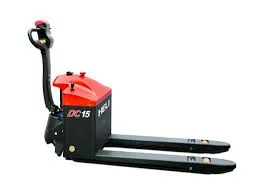


Types of Pallet Trucks An Overview
Pallet trucks, also known as pallet jacks or pump trucks, are essential tools in warehouses, retail environments, and distribution centers. They facilitate the movement of heavy loads by allowing operators to lift and transport pallets with ease. Understanding the various types of pallet trucks available can help businesses make informed decisions about which equipment best suits their needs.
1. Manual Pallet Trucks
Manual pallet trucks are the most basic type and are commonly used in smaller operations. Operated by hand, these trucks feature a hydraulic lifting mechanism activated by a pump handle. Users simply insert the forks beneath the pallet, pump the handle to raise the load, and then manually push or pull the truck to the desired location. While manual pallet trucks are cost-effective and straightforward, they require physical effort and may not be suitable for continuous heavy lifting.
For operations requiring more efficiency and reduced labor, electric pallet trucks are an excellent solution. These trucks come equipped with electric motors that assist with lifting and moving pallets, significantly reducing the physical strain on operators. Electric pallet trucks are particularly beneficial in larger warehouses where high volumes of goods need to be moved frequently. They typically have longer battery life and can handle heavier loads compared to their manual counterparts, making them a popular choice for many businesses.
3. High-Lift Pallet Trucks

High-lift pallet trucks are designed for tasks that require both lifting and transportation. Unlike standard pallet trucks, high-lift models can raise the load to significant heights, making them ideal for loading and unloading tasks at elevated areas such as truck beds or storage racks. This versatility allows workers to pick up items without needing a separate lifting device, thereby optimizing workflow and enhancing safety.
4. Ramping Pallet Trucks
Ramping pallet trucks are specifically designed for maneuvering on inclines or uneven surfaces. These trucks feature built-in ramps or wheels that are adept at navigating slopes, making them useful in environments such as loading docks or outdoor areas where accessibility might be an issue. With their unique design, ramping pallet trucks provide greater stability and control over uneven terrain.
5. Specialized Pallet Trucks
In addition to the standard types, there are numerous specialized pallet trucks designed for specific applications. For instance, cold storage pallet trucks are constructed to withstand extremely low temperatures, making them ideal for freezer applications. Similarly, chemical-resistant pallet trucks are built with materials that can endure harsh environments and exposure to corrosive substances.
Conclusion
Choosing the right pallet truck can greatly affect productivity and safety in material handling operations. Whether opting for manual, electric, high-lift, ramping, or specialized pallet trucks, understanding the features and benefits of each type is crucial. Businesses should assess their specific needs, such as load capacity, frequency of use, and environmental conditions, to select the most appropriate equipment. With the right pallet truck, companies can improve their operational efficiency and streamline logistics.



